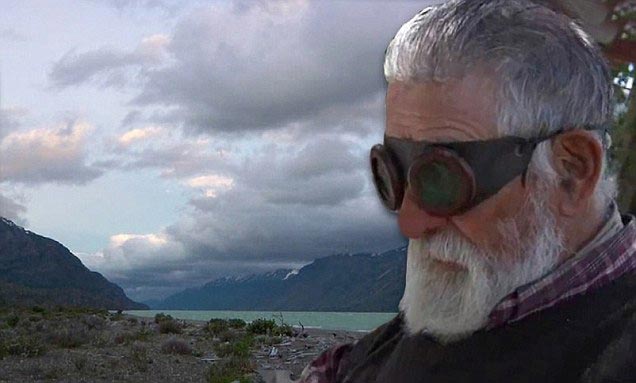 NY:
NY: Surrounded by the stunning snow-topped mountains and sparkling lakes of Chilean Patagonia, his only interruptions are bleating sheep and the crackle of the radio.
This is the solitary life of Faustino Barrientos, a cowboy who has spent more than 46 years in isolation by Lake O'Higgins - one of the most remote corners of the world.
Since 1965, Barrientos has worked as a gaucho - a horse-riding rancher and shepherd living in the southern swath of Chile and Argentina.
In December, he was visited by journalists from Vice, an independent media company in Brooklyn, New York. It took the reporters four days to travel to his home, made from a salvaged fishing boat.
'I don't need money,' he told them after welcoming them to his home. 'I have enough to eat. Life seems to be better when you're alone.
'They want to kick me out of here but they can't. I'm staying here until the very end.'
Barrientos grew up on the shores of Lake O'Higgins but after his 11 siblings moved away and Pinochet started rising up the ranks of power, he moved to Argentina.
While travelling around the country and working at construction jobs, he picked up the skills to sustain himself when he returned to the craggy, mountainous Patagonia of Chile.
Lake O'Higgins is one of the most remote areas of Patagonia and is the least populated region in Chile. It is also one of the world's most sparsely populated places outside Antarctica.
Barrientos's land has two buildings - a small hut where he sleeps, eats, listens to the radio and pours over stacks of newspapers when they are delivered to him twice a year.
The other building stores boxes of food - tins of soups and desserts, bags of sugar and flour, tubs of lard - which are delivered by a boat that has started passing his quiet corner every ten days.
He also survives on cows and sheep reared on his land, and he keeps track of time with a calendar that he marks off everyday.
Every two years he rides with his cattle for two days to Villa O'Higgins, a small community of several hundred people, 25 miles away. He leads the herd along ravines and through rivers to the town.
There, he sells the cattle, raising enough money for his humble lifestyle.
He enjoys a few modern amenities, keeping up on politics and sports scores over a radio in his home. He has watched television just once in his life.
'It's good to know what's going on out there,' he said. '[The radio is] how I learn about politics in different countries. That's also how I taught myself politics.'
Two years ago, when the government discovered he had guns on his property, they paid a visit and made a deal: they would take the guns but leave him solar panels in exchange.
He took them up on their offer, but says he rarely uses the solar panels. And, he added, he's got new guns anyway. 'I've got more but I won't hand them over,' he said.
But his life is becoming increasingly burdened with modern-day life. About 10 years ago, a government ship began cruising the lake weekly.
Now, there is also a tourist ship that brings sightseers to the O'Higgins Glacier every ten days.
He also has lodgers on his land, a man and his wife who have brought their animals and help Barrientos with his. The lodgers describe Barrientos as a surprisingly sociable man.
The Vice documentary, which can be seen in its entirety on its website, was filmed in December. A small team went to speak with him about the changing face of Patagonia and the gaucho lifestyle.
 NY: Surrounded by the stunning snow-topped mountains and sparkling lakes of Chilean Patagonia, his only interruptions are bleating sheep and the crackle of the radio.
NY: Surrounded by the stunning snow-topped mountains and sparkling lakes of Chilean Patagonia, his only interruptions are bleating sheep and the crackle of the radio.